Working from home burnout can affect anyone. At first, working from home can seem preferable to commuting into an office. However, turning your home into your workspace presents unique challenges. This lack of distinction between work life and personal life takes a toll that can lead to burnout.
We’re living in strange times. Overnight the world’s workforce have been forced to adapt from an office to working from home. This may have been a convenient novelty at first, but months in, and remote working is taking a toll.
Understandably, managers are concerned about the productivity of their newly remote workforce. Afterall, the home is full of countless distractions and entertainment options. So, it makes sense to apply more pressure to ensure productivity.
But here’s the thing; research shows that underperformance is the least of our worries. What we really need to be concerned about is over performance leading to burnout.
Table of contents
What is Working from Home Burnout?
Between flexible work hours and smartphones the lines between work and life were already blurry. Then the pandemic hit.
Suddenly, we were all forced to work just meters from where we eat, sleep and relax. Even the most devout adherents of work-life-balance are struggling to keep the two separate.
This lack of distinction greatly increases the risk of burnout. But, what do we actually mean when we use this term?
Burnout
According to the World Health Organisation, burnout is a feeling of energy depletion at work. This is usually accompanied by feelings of increased mental distance from your job and reduced efficiency.
Burnout is caused by long periods of stress, uncertainty and a lack of boundaries.
Burnout and Working from Home
The pandemic amplified all three of these factors, as well as adding the challenges of adapting to working from home.

Also, due to the economic impacts of the pandemic, many employees feel like their jobs are on the line. As a result they’re working extra hours to signal loyalty and ensure they keep their jobs. With this in mind, It makes perfect sense that so many of us are struggling with burnout.
The Extent of the Problem
According to a poll by employment platform Monster, 69% of employees are currently experiencing burnout symptoms while working from home1.
Working from home leaves women especially vulnerable. Research has shown women experience greater stress and anxiety working from home than men do2. Women are also more likely to feel the burden of caring for children by themselves.
Working from Home Burnout: The Signs
Now we understand the conditions that lead to burnout, let’s explore some of the red flags.
Remember, stress and burnout affects everyone differently, so these warning signs might not apply to you. It’s important to trust yourself and your body. If you think you might be suffering from burnout, you probably are.
You’re Always on the Clock
Are weekends and weekdays blurring into one?
Do you find yourself constantly checking emails?
Are you never not thinking about work?
An inability to turn off from work is a good indicator that you might be experiencing working from home burnout. This can also be accompanied by an inability to delegate or hand-work over to colleagues.

Declining Performance
Burned out workers struggle to pay attention. They find themselves doing whatever they can to not work. When they actually do work, their performance is greatly reduced due to a lack of energy and a lack of focus.
Burned out workers also suffer from an overall decline in confidence and don’t believe they can achieve their goals. The great irony of burnout is that although you can’t switch off from work, you also can’t work effectively.
Declining Mood
Those heading towards burnout sometimes experience mood swings. These generally manifest as outbursts of anger or irritation. Unchecked, these mood swings can turn into anxiety, panic attacks and depression.
Unsure if you’re experiencing working from home burnout? Here are some questions to ask yourself:
- Are you feeling cynical or negative about work?
- Is it becoming difficult to perform work-related problem solving?
- Are you getting increasingly agitated and angry?
- Do you feel depressed as a result of work-related stress?
- Is work-related stress causing you anxiety?
If you answered yes to any of these questions it might be worth trying some of the burnout-busting strategies below.

Overcoming Working from Home Burnout
So, now it’s time for the all important question: How do you leave work at work when it has invaded your home space?
Don’t worry, there’s countless strategies you can implement to re-energise and overcome burnout. However, they all fall under one of three categories:
Structure
You may not have realised it, but commuting to work can be a blessing in disguise.
Showering, getting dressed and the car or train ride into the office are all powerful rituals. They act as signals, letting our bodies know when our work day starts and when it ends.
Without these rituals it can be hard to compartmentalise work. Instead, work expands into every aspect of our lives. Recreating these rituals, and this structure, is key to combating this.
Here are some practical things you can do to bring structure back to your life:
- Start the day by showering and getting dressed as if you’re going to the office
- Go for a walk at the start and end of your workday to replace your commute
- Set strict work hours and ensure you don’t check or respond to work emails outside of these hours
- Take periodic breaks to break-up your work day and improve focus

Balance
Like I mentioned earlier, working from home can allow work to dominate our lives. So, it’s important we ensure we do other activities to return balance. Here’s some suggestions:
- Exercise: It really can’t be overstated how much of a positive impact exercise has on both our bodies and our minds. Do some pushups, go for a run, go for a walk. Just get moving!
- Find a hobby: Intense work should be balanced with intense play. If work is the only thing that you feel passionate about, it’s time to connect other parts of your personality.
- Take some time off work: It might seem like a weird time to take annual leave, but taking some time to be completely free of work can make a huge difference. Even just a few days can be highly beneficial.

Communication
Working from home is isolating. It can be tempting to fold in ourselves and isolate ourselves further. But, it’s important to maintain our social connections.
Try replacing social gatherings with weekly Zoom or Skype catch ups. Not only is this a good way to stay in contact with your social circle, the recurring weekly commitment creates structure.
It’s also key to communicate with your manager or supervisor. Schedule a meeting to discuss the challenges you’re experiencing performing your role remotely. Your scope of work may also need to be addressed, or, you might need to simplify tasks to increase your productivity.
If you are experiencing serious mental health concerns, such as suicidal thoughts, make sure you reach out to a mental health professional. For readers in Australia, you can call Lifeline on 13 11 14.
Need Some Help Overcoming Working From Home Burnout?
Are you struggling with working from home burnout?
Well, you’re not alone.
I want to help you light your fire again. To equip you with the tools to manage the challenges of working from home.
That’s why FIIT Collective created REIGNITE: Overcoming Working from Home Burnout.
REIGNITE is a 4 hour on demand event. The workshop presents a holistic approach to combating burnout with practical tips designed to return balance and help you succeed while working from home.
Diverse range of speakers
The on demand event features an impressive roster of expert speakers including:
- Sean Hall: The CEO and founder Energx. He assists organisations and individuals to work at their energised best, increasing collective productivity and creativity.
- Dr Amy Imms: a medical doctor and founder of The Burnout Project
- James Chapman: a high performance coach and former olympic rower. He specializes in overcoming adversity and developing resilience.
- Laurel Farrer: an Internationally renowned remote work expert and consultant.
- And, Chibs Okereke: a meditation, resilience and burnout specialist
At REIGNITE you will:
- Identify, manage and overcome working from home burnout
- Learn how to respond to adversity
- Discover how to boost your energy, naturally
- Learn to work with your Moon Cycle, not against it
- Move your body with a full body stretch
- Join a guided meditation focused on resilience
Everyone who registers will have LIFETIME ACCESS to all of the presentations within our Membership Portal, so you won’t miss a thing.
NOTE: The content is suitable for all women who are working from home, not just those working in tech.
1Source: Poll, Monster (July 21, 2020)
2Source: Worker Confidence Index, LinkedIn (September 9, 2020)



